Theology and Doctrine Collection (16 vols.)
Digital Logos Edition
Overview
The 16-volume Theology and Doctrine Collection draws together sixteen diverse titles on a variety of theological and doctrinal issues. These volumes include contributions from some of the most influential and thoughtful voices in theology today, such as Stanley Hauerwas, John McIntyre, Eberhard Jüngel, and Stanley E. Porter. Special attention is given to the theology of five important theologians: Wolfhart Pannenberg, Austin Farrer, Dumitru Staniloae, Karl Barth and Thomas Aquinas. Ample space is also given to the psychology and theology of forgiveness, the doctrine of the Holy Spirit, the problem of suffering, the origins of Christology, and creation ex nihilo.

- Title: Theology and Doctrine Collection
- Volumes: 16
- Pages: 4,548
This title is included in the following collections
You can save when you purchase this product as part of a collection.
Essential Reference Bundle (38...
$1,243.64$674.99Logos 7 Lutheran Portfolio Leg...
$4,749.99$4,749.992025 Lutheran Portfolio
$4,749.99$4,749.992025 Ultimate Library
$23,999.99$23,999.99
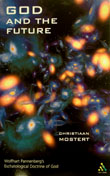
An introduction to the theology of Wolfhart Pannenberg. Pannenberg's extensive works, especially his recently published Systematic Theology, are increasingly regarded as of major importance. Professor Mostert here provides not only a general introduction to Pannenberg's theology, and many keys to enable the serious reader of theology to access Pannenberg's individual works, but also sets Pannenberg's complex thought in the broadest context of contemporary philosophical and theological thought.
Christiaan Mostert is Professor of Systematic Theology, Uniting Church Theological Hall, and Lecturer in Theology, United Faculty of Theology, Melbourne.
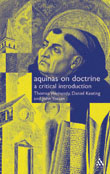
This book provides a critical study of the main Christian doctrines as understood and explained by Thomas Aquinas. The whole Thomistic revival of the last century focused almost exclusively on Aquinas as the Christian philosopher. Thus books and articles developed his understanding of being, his epistemology, natural theology, etc. However little has been done, even to this day, by way of examining Aquinas' teaching on the major Christian doctrines.
Thomas G. Weinandy is the Executive Director of the Secretariat for Doctrine and Pastoral Practices of the United States Conference of Catholic Bishops.
Daniel A. Keating teaches at the Sacred Heart Seminary, Detroit.
John P. Yocum teaches at Greyfriars, Oxford.
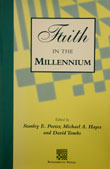
At the close of one millennium and the beginning of a new one, this conference volume reflects on the past and looks forward to a new era in terms of the development of faith. Although most of the papers in the volume address issues concerning Christian faith, the volume is not confined to such a perspective, since the concept of faith is treated here in an encompassing and broad manner. The historical perspective reaches back several millennia, addresses contemporary issues of economics and justice as they have a bearing on faith, and looks to the future as a new millennium presents its own problems and potential opportunities.
Stanley E. Porter is Principal, Dean and Professor of New Testament, McMaster Divinity College, Canada.
Michael A. Hayes is Head of the Department of Theology and Religious Studies at St Mary's College, Strawberry Hill, Twickenham in the University of Surrey.
David Tombs is Senior Lecturer in Theology at the University of Surrey Roehampton, London.
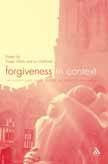
The last 20 years have seen the development of a growing body of psychological literature on the long-neglected subject of forgiveness. Forgiveness has been widely regarded as a purely religious construct. However, recently it has been advocated in many different secular contexts as offering an appropriate and healthy means of release. This volume continually engages the reader on both psychological and theological levels in a sustained dialogue that has not permeated any of the books already available on forgiveness.
Fraser Watts is Starbridge Lecturer in Theology and Natural Sciences, and Director of the Psychology and Religion Research Programme, University of Cambridge.
Liz Gulliford is Research Assistant, Psychology and Religion Research Programme, University of Cambridge.
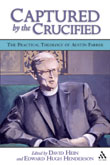
The British theologian and New Testament scholar Austin Farrer was a member of “the Oxford Christians,” conversing frequently with C. S. Lewis, J. R. R. Tolkien, Dorothy Sayers, and T. S. Eliot. A. N. Wilson has called Farrer “the one true genius of the Church of England in the 20th century.” Farrer’s theory about the Synoptic Problem remains one of the most debated theories of Synoptic relationships in contemporary New Testament scholarship. The editors have put together a book that makes the practical, spiritual meaning of Farrer's thought available to those who desire to integrate serious thinking with faithful life.
Contributors to the volume include Ann Loades (University of Durham), Diogenes Allen (Princeton Theological Seminary), Julian N. Hartt (University of Virginia), Charles Hefling (Boston College), and O.C. Edwards (Seabury-Western Theological Seminary).
This volume represents a considered and comprehensive review of Austin Farrer’s achievement as priest, biblical scholar, philosophical theologian, and spiritual guide. It bears impressive witness to the unified vision which inspired his life and work and explains how, although firmly rooted in his time and place, he remains significant today for all who seek to understand and practice the Christian Faith.
—Basil Mitchell, Emeritus Fellow, Oriel College, University of Oxford.
Edward Hugh Henderson is Professor of Philosophy at Louisiana State University and the co-editor with Brian Hebblethwaite of Divine Action: Studies Inspired by the Philosophical Theology of Austin Farrar.
David Hein is Professor and Chair of Religion and Philosophy at Hood College and is the author of Noble Powell and the Episcopal Establishment in the Twentieth Century.
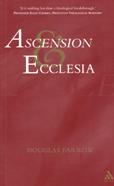
Recent theology offers few attempts to come to grips with the meaning and implications of the ascension of Jesus. Professor Farrow begins with a discussion of the biblical treatment of the ascension and Eucharistic celebration, from which emerges the unique ecclesial worldview. There are chapters on the treatment of these ideas by Irenaeus, Origen and Augustine, and on developments up to the Reformation. He explores the link between ideas of the ascension, cosmology and ecclesiology. Farrow goes on to examine the difficulties faced by the doctrine of ascension in the modern scientific world. In a final chapter he calls for an ecclesiology, which does not marginalize the human Jesus.
It is nothing less than a theological breakthrough.
—Professor Ellen Charry, Princeton Theological Seminary
A key study of an important but neglected topic. Farrow demonstrates admirably how much in theology depends upon a right approach to the ascension.
—Professor Miroslav Volf, Yale University
This is a most important book. Professor Farrow’s meticulous scholarship and penetrating theological judgment will together guarantee this study a long life and widespread influence.
—Professor Colin E. Gunton, King’s College, London
Douglas Farrow is Professor of Theology and the History of Christian Thought, McGill University, Montreal.
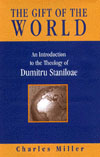
Until recently (and partly because of the political circumstances of the Romanian church prior to 1989), English-speaking readers have had access to very little of Staniloae's writing. But his great masterpiece, Orthodox Dogmatic Theology, is at last beginning to appear. Staniloae's theological stature has been compared to Barth, Rahner and Schillebeeckx. In him we meet not only a contemporary master of Orthodox thought but a Christian thinker of ecumenical proportions - one who addresses the needs and aspirations of Christians living in a technological age, and who offers an important and timely contribution to “Green” theology.
The present volume is described by the author as a “prolegomenon” to the reading of Staniloae. It takes one vital theme from the centre of his dogmatic system - that of creation as the primordial gift of God - and shows how this applies both to sacramental theology and to ecclesiology. Containing a guide to the works of Staniloae, Charles Miller's book will be of immense value to all those who are struggling to understand the meaning of the created order: Anglicans, Catholics and Orthodox alike.
Dumitru Staniloae was one of the outstanding Orthodox theologians of our century. In this book Charles Miller provides us with an admirable introduction to his work, short but substantial, lucid and well-balanced… this is a book which could transform our view of the potentials of theology to meet the challenge of the new millennium.
—Canon A. M. Allchin
Charles Miller is Associate Professor of Theology, Nashotah House Episcopal Seminary, Wisconsin.
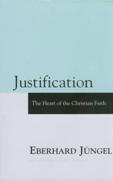
This significant work, precipitated by the Lutheran-Roman Catholic Joint Declaration on the doctrine of justification, represents Eberhard Jüngel’s most sustained theological writing for some time. Jüngel examines the role of justification in Christian Faith – and emphasizes its central importance.
He traces the history of the concept of “justice” in Greek thought, and of the Old Testament parallel concept “righteousness.” He then moves to a consideration of the righteousness of God in its Christian context, and in particular to God’s righteousness in Christ. A major contribution to theological discussion is found in his fresh and fearless treatment of the unfashionable topic of sin.
Throughout the work, Jüngel constantly interacts with the great Catholic and Protestant thinkers, his skill as a theologian matched by his insight as a philosopher.
It is a vintage piece of Jüngel in one of his most characteristic voices: intellectually vigorous, polemical… written with an eye not only to fundamental issues in dogmatics but also to pastoral questions of Christian existence and action.
—John Webster
Eberhard Jüngel is Professor of Systematic Theology and Philosophy of Religion, University of Tübingen, Germany.
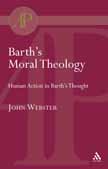
John Webster shows how Barth's work as a whole should be regarded as a moral theology. He opens with a study of Barth's ethical thinking in key writings from the period of his break with theological liberalism, and then highlights the moral anthropology set out in his lectures on ethics from the end of the 1920s. He studies the themes of original sin, hope and freedom in Barth's Church Dogmatics, illustrating Barth's concern to prove that divine grace shapes and restores human agency. He explores the theme of the missionary activity of the church in relation to Barth's remarkable treatment of the prophetic office of Christ. He also draws a contrast between the moral anthropology of Barth and Luther.
… a well-researched and closely-rounded study of Barth's theology of human action. The author concludes the book with two outstanding chapters: first, a profound comparison of Luther and Barth on human agency, and second, the influence of Barth and Luther on one of today's leading theologians, Eberhard Jungel. To be commended without hesitation.
—John D. Godsey, Wesley Theological Seminary
John Webster was Lady Margaret Professor of Divinity, University of Oxford, and is now Professor of Systematic Theology, University of Aberdeen, Scotland.
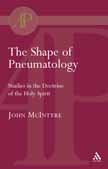
MacIntyre’s work addresses addresses one of the most difficult aspects of the doctrine—the heterogeneity of the biblical and traditional material from which it is derived—and points to the areas where the church must act to recover the sense of the immediacy of the Holy Spirit.
The book explores the nature, origins and development of the doctrine of the Holy Spirit, finding its many recurring expressions deriving on the one hand from Scripture, and on the other from tradition in the form of the doctrine of the Trinity. The biblical models are particularly apparent in the vigorous modern Pentecostalist and charismatic churches while the Greek and Latin Fathers provided a dominant series of Trinitarian models which recur in varying forms across the history of the doctrine of the Spirit, notably in Calvin and Barth.
John McIntyre considers whether the modern church has “betrayed” the insights, vision and experience of the New Testament church. He concludes by pointing to the areas in which the church must act if it is to recover the sense of the immediacy of the Spirit both in its corporate life and in the lives of individuals.
John McIntyre is Emeritus Professor of Divinity, University of Edinburgh.
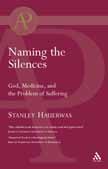
Why does a good and all-powerful God allow us to experience such pain and suffering? This question, so often asked, has been approached in a variety of ways. In this illuminating and powerful book, Hauerwas explores why we seek explanations for suffering and evil so desperately in today’s world. He draws on true cases of ill and dying children to illustrate and clarify his discussion of the theological issues. Modern medicine, he claims, has too often become a noisy way to hide the gaping silences created by the experiences of childhood illness and death. He discovers for us a God who “can give a voice to that pain in a manner that at least gives us a way to go on.”
Offering no easy answers or false comforts, Naming the Silences is a provocative and sensitive exploration of pressing issues that concern us all.
This valuable book deserves to be widely read and appreciated.
—James F. Childress, University of Virginia
Hauerwas’ book is a theological classic.
—Duncan Forrester, University of Edinburgh
Stanley Hauerwas is Gilbert T. Rowe Professor of Theological Ethics, Duke University.
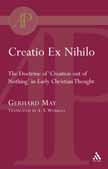
Do we have to understand Genesis Chapter 1 as depicting “creation out of nothing”? The fact is that it has not always been interpreted in this way. Justin Martyr, for example, thought that the “chaos” over which the Spirit hovered was indeterminate matter on which God imposed form and order. Some medieval Jewish texts retain views of creation which do not imply that the universe came into being “out of nothing,” and so do some Islamic traditions.
This important work challenges the generally unquestioned assumption that the doctrine of “creation out of nothing” was inherited by Christianity along with the Jewish scriptures which the Church adopted.
The thesis is advanced that the doctrine arose in the second century CE, and that the Gnostic Basilides was the first to advance the idea as a theory. In the Christian mainstream a shift took place between Justin Martyr, who accepted the notion of pre-existent matter, and Theophilus of Antioch. It was the impact of fresh philosophy which stimulated this specific theoretical response to the question of how and whence things came into being, as distinct from the scriptural affirmation that things which did not exist before had been fashioned or formed by almighty God, the King of the Universe.
There is no other study which concentrates on tracing this particular piece of intellectual history – a development which had crucial repercussions for subsequent Christological debates.
Gerhard May is professor of Theology at the Johannes Gutenberg University, Mainz.
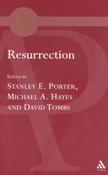
The theme of Resurrection has continued to prove fascinating for a variety of writers and thinkers, finding expression not only in sacred texts but in other works of literature and the arts. This volume contains the papers from one of the Roehampton Institute London Conferences. In this volume, scholars from a variety of places and varying academic disciplines have addressed the concept of resurrection from a number of critical perspectives. As one might expect, these include analyses of how the resurrection is understood in the biblical and other religious traditions. Also included in this volume are sustained treatments of the concept of resurrection as it appears in various literary texts and other artistic forms of expression.
Stanley E. Porter received his B.A. at Point Loma College, an M.A. from Claremont Graduate School, another M.A. from Trinity Evangelical Divinity School, and a Ph.D. from the University of Sheffield. He has taught for post-secondary institutions in Canada, the USA, and the UK.
David Tombs is Senior Lecturer in Theology at the University of Surrey Roehampton, London.
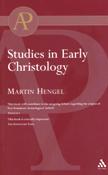
Christology, the doctrine concerning the revelation of God in Christ and the salvation of humanity through Christ, is at the heart of Christian theology and at the heart of the church’s proclamation.
These studies, including hitherto unpublished work, explore the origins of Christology. They explore, for example, the earliest Christological thinking, the messianic claim of Jesus, the reasons for the condemnation of Jesus, the exaltation of Christ, the development of hymn singing, the development of Christological titles, and neglected features of Johannine Christology. In these mysterious beginnings, Martin Hengel discovers a coherent and unique process.
In a substantial foreword, Professor Hengel describes the context of his work in modern scholarship and develops his current thinking.
…a book of immense value.
—Epworth Review
Martin Hengel is Emeritus Professor of New Testament and Ancient Judaism, University of Tübingen, Germany.
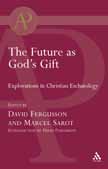
International theologians consider the importance of Christian eschatology – both to the life, authority and hope of the church in the world, and to contemporary life and thought generally. Issues addressed include the understanding of time, the nature of eschatological imagery, the status of apocalyptic and millenarian language, and the political and ecological context of modern eschatology.
David Fergusson is at the University of Aberdeen.
Dr. Michael Sarot is Lecturer in Philosophy of Religion at the University of Utrecht.
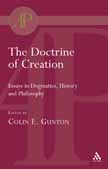
This study, by leading scholars from around the world, engages with central hermeneutical, philosophical and theological dimensions of the doctrine of creation. Particular prominence is given to discussion of creation “out of nothing,” the relation of eternal creator to temporal creation, the Trinitarian construction of the doctrine and its ethical implications. Opens up new dimensions to an important topic.
Colin E. Gunton was Professor of Christian Doctrine, King's College, London, UK, and a Minister of the United Reformed Church.